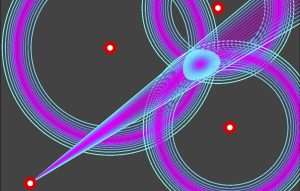xG-Loc Datasets
Made openly available xG-Loc, the first open access dataset for location awareness fully compliant with 3GPP specifications. xG-Loc includes received localization signals, time/angle measurements, and analytics in various scenarios and frequency ranges.
xG-Loc is publicly available on IEEE DataPort at this link.

3GPP-compliant Simulation Platform for 5G and Beyond Localization
Developed a simulation platform for 5G and Beyond localization which is fully compliant with 3GPP technical specifications.
Mercury: Cooperative Networks for Ubiquitous Localization and Navigation
First Prize of the IEEE ComSoc Student Competition “Communications Technology Changing the World”, IEEE Communications Society, 2016
This project provides a ubiquitous and highly accurate localization solution, especially in global navigation satellite system (GNSS) challenged environments, such as buildings, urban canyons, under tree canopies, and underground. We have developed and implemented network localization and navigation, a new paradigm that exploits the spatiotemporal cooperation and environmental knowledge. In particular, users help one another to estimate their positions, which circumvents the need for high-density infrastructure. The proposed solution, named Mercury, is platform-agnostic. This is demonstrated through its implementation in two different systems. In the first system, ultra-wideband (UWB) radios make range measurements with each other and exchange position distributions through UWB signals. In the second system, smartphones make range measurements through acoustic signals and communicate with each other through Bluetooth signals. Both systems have achieved satisfactory localization accuracy in a ubiquitous manner, even though the ranging technology, communication medium, and processor are different. The implemented systems are ready for technology transfer, enabling a variety of emerging wireless network applications.
Peregrine
IEEE LATINCOM Best Paper Award for IEEE Latin-American Conference on Communications, 2017.
Peregrine is a 3-D cooperative network localization and navigation (NLN) system. Peregrine nodes are lowcost business-card-sized devices, consisting of a microprocessor, a commercially available ultra-wideband (UWB) radio module, and a small battery. Recently developed distributed algorithms are used in Peregrine to solve the highly interrelated problems of node inference and node activation in real-time, enabling resource efficiency, scalability, and accuracy for NLN. Our results show that Peregrine achieves decimeter-level 3-D position accuracy in a challenging propagation environment.